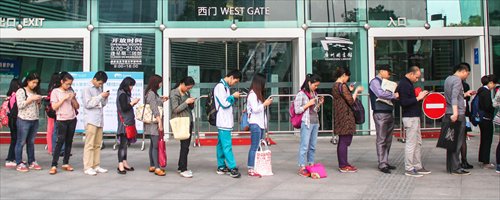Dodgy devices

People look at their mobile phones on Monday in Guangzhou, South China's Guangdong Province. Photo: IC

Confiscated equipment used as an illegal base station Photo: IC
Wang Qiao, a white-collar worker in Beijing's Central Business District, receives a text message from an unknown mobile phone number at around 10 pm every day.
"If you need a girl, please call ***."
Wang finds this daily harassment annoying, but when he complained about it to his telecom operator, he was told that the message originated from an unauthorized base station.
In February this year, China's Ministry of Public Security launched a campaign to clamp down on the illegal manufacturing, sale and use of illegal base stations, an underground business that has begun to affect the security of telecom services.
By March, the joint crackdown with eight other government departments, including the Publicity Department of the Communist Party of China Central Committee and the Ministry of Industry and Information Technology, had identified 3,540 cases of suspected crimes involving illegal base stations.
One criminal organization in Northeast China's Liaoning Province was suspected of having sent out over 200 million spam messages, the ministry said.
Police authorities have arrested a total of 1,530 suspects for using illegal base stations, closed 24 manufacturing sites and seized over 2,600 devices, according to a statement issued by the Ministry of Public Security on March 25.
The police also called on the public to report such messages to the authorities.
"Two types of people use the illegal base stations: swindlers who send fraudulent messages and vendors who send out promotional messages," Xiang Ligang, CEO of telecom industry portal cctime.com, told the Global Times Tuesday.
Don't trust it
Illegal base stations are unlicensed telecommunication stations that allow criminals to send spam messages to nearby mobile phone users.
Some senders disguise their messages as communications from judicial or administrative bodies or customer service departments of telecom operators and banks, and there have been cases in which citizens have fallen prey to this kind of fraud, the ministry said.
When the illegal base station is at work, it blocks the signals of telecom operators and sends the messages prepared by the senders, according to the ministry.
"Posting an advertisement in a newspaper for one day will cost around 500 yuan ($80.65), which is enough to pay for 50,000 text messages from these illegal operators. That's why vendors are tempted to subscribe to these illegal services," Xiang said.
"Someone only needs a laptop, a mobile phone, Short Message Service (SMS) software and an illegal base station to start his illegal business," Fu Liang, a Beijing-based independent telecom analyst, told the Global Times Tuesday.
Illegal base stations cost around 70,000-80,000 yuan per set, a seller of telecom equipment on taobao.com, China's largest online marketplace, told the Global Times Wednesday on condition of anonymity.
The technological requirements for manufacturing base stations are not high, and many workshops are able to produce them, given the country's advanced telecom hardware capacity, Fu noted.
"The software, which is the key element enabling the operation of illegal base stations, has already become widespread, making the illegal service more rampant and hard to control," Fu said.
Potential threat
The existence of illegal base stations has become a serious problem, partly because China is the world's largest mobile phone market, with 1.24 billion users by January 2014, according to the Ministry of Industry and Information Technology.
"Telecom operators cannot target and send SMS messages to a specific geographic region, but an illegal base station can. This means the operators of illegal base stations can offer a promotional channel targeting certain customers," Xiang said.
Xiang noted that if a telecom operator wants to send promotional materials to subscribers through its service, it is not easy to get permission for this from regulators.
Part of the telecom operators' business is to help shopping malls send SMS messages to their customers. This legal business is now being undermined by rogue operators who have low price advantages, Fu said.
There is no way these illegal messages can be censored or regulated, which means that it is possible to spread pornographic or other kinds of harmful information, Fu noted.
Xiang said illegal base stations pose significant potential danger to public security.
"Suppose somebody posed as a member of a seismological bureau and began sending messages claiming that there would be an earthquake on a certain date. It would cause panic," Xiang warned.
Wrong target?
Offenses related to illegal base stations may be associated with crimes including fraud, illegal business operations, disturbing telecommunications and illegally obtaining citizens' personal information, according to Fu.
"Light sentences in this field have failed to deter crime," Fu said.
The manufacturing and sale of illegal base stations should result in a fine of up to 30,000 yuan, according to draft regulations issued by the State Administration for Industry and Commerce on April 4.
If prosecutors charge illegal operators with fraud, then the punishment will be heavier, including prison sentences of up to 10 years, Fu said. However, Fu believes the regulators "have got the wrong end of the stick. The crackdown is focused on the upper stream, like producers of the equipment, and people offering this service. People who pay to use this channel to spread advertisements are going unpunished," he noted.
Fu said that while underground workshops are difficult to trace, and mobile signals are difficult to detect, the information of those who pay for the illegal services is clearly written in the advertisements.
"When we hit those who purchase illegal base station services so hard that no one dares to post even a single advertisement via this channel, then we can declare victory," Fu said.